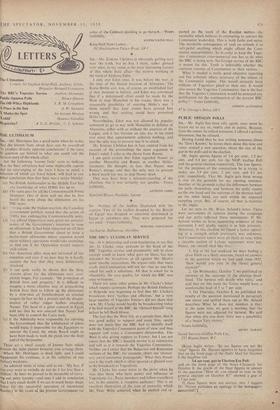The Ultimatum Comdr. Sir Stephen King-Hall, Anthony Gibbs, Brigadier Bernard
Fergusson
The BBC's Yugoslav Service Andrew Alexander Public Opinion Polls Henry Durant The Off-Whke Highlands T. R. 114 . Creighton A Place in the Sun A. W . Steward X Marks the Spot Sir Jeremy .Most.rit
r ic e Girodias
Hypocrisy? A. E. G. Wright, C. L. Schoies
THE ULTIMATUM Slit—Mr. Henriques has a good point when he writes that ;he known facts about Suez can be assembled to produce directly opposite Conclusions' if the facts in question are limited to what one could call the tactical story of the whole affair.
&it the following 'known facts' seem to indicate that the Suez adventure had some deplorable aspects and no rearranging of the facts I have in mind, a. selection of which are listed below, will lead to any Other conclusion than that Suez was a major blunder.
(a) No British Ambassador in the Middle East had
any knowledge of what HMG was up to.
(h) Me same goes for all,the Commonwealth Prime Ministers. One of them told me that he first heard the news about the ultimatum on the BBC news.
(c) .vmg aside the Indian reaction, the Canadian Governinent publicly stated that the action of !-'t MG was endangering Commonwealth unity.
(d) i ne official Opposition were given ten minutes', notice of the Government's intention to issue an ultimatum. It had been supposed up till then that a British Government about to issue a twelve-hour ultimatum whose rejection would. mean military operations would take soundings to find out if the Opposition would support such action.
(e) Our American allies were not informed of our intention and even if we pass that by it hardly excuses the fact that they were deliberately deceived.
(f) It can quite easily be shown that the three reasons given for the ultimatum were com- pletely bogus. For example: 'the protection of British lives and property.' It is difficult to imagine a more effective way of jeopardising British lives than to follow up the ultimatum by a slow-time air bombardment on selected targets (in 'fact we hit a prison) and the dissem- ination of rather vulgar leaflets attacking Nasser. The head of a great concern in Egypt told me that he was amazed that Nasser had been able to control the Cairo mob.
(e) lithe Admiralty were responsible for advising the Government that the withdrawal of pilots would make it impossible for the,Egyptians to operate the Canal, the whole Board ought to have been made to walk the plank into the deep end of the Serpentine.
These are a .small sample of known facts which present the same .picture however you arrange them.
Where Mr. Henriques is dead right, and 1 could lupplement his evidence, is in his criticism of our ihilitary weakness.
An admired uncle of mine said to me: 'My boy. if You ever want to swindle do not do it for less than a ntillion.' At Suez we proved to be incapable of carry- ing out petty larceny—and may I add in conclusion Ulla I very much doubt if we are in much better shape today for the successful operation of intentional banditry 'in the event a the present Government (or
some of the Cabinet) deciding to go berserk.—Yours STEPHEN K ING•HALL King-Hall News Letter.
162 Buckingham Palace Road, SW!










































 Previous page
Previous page